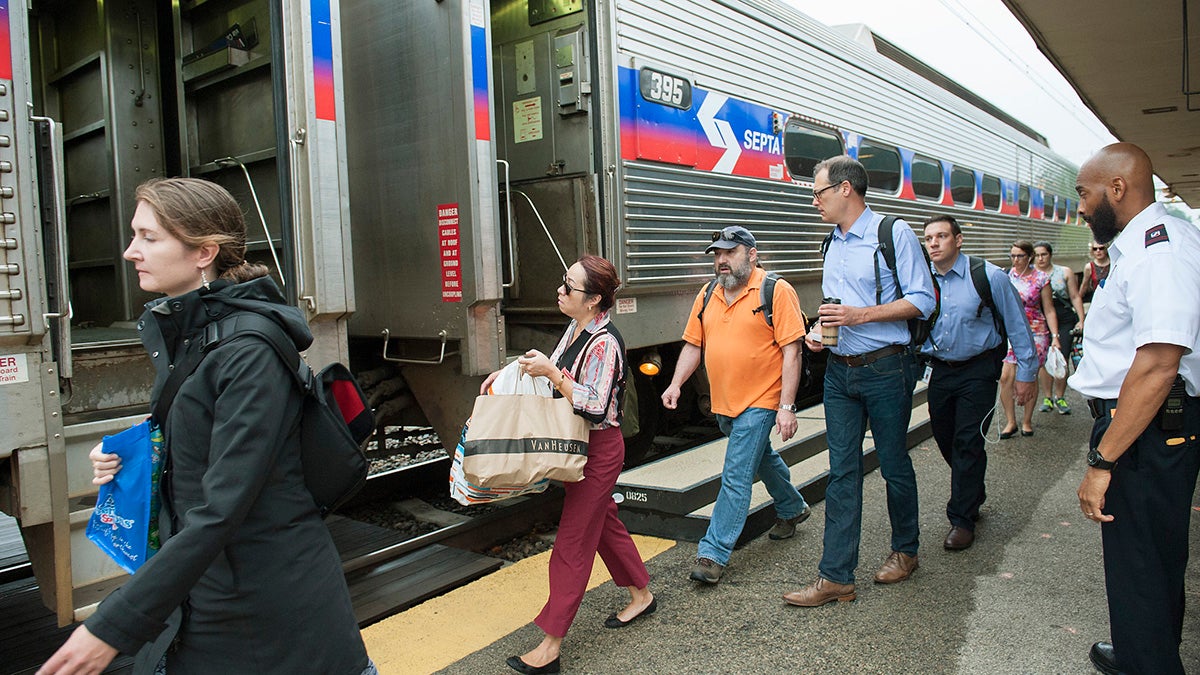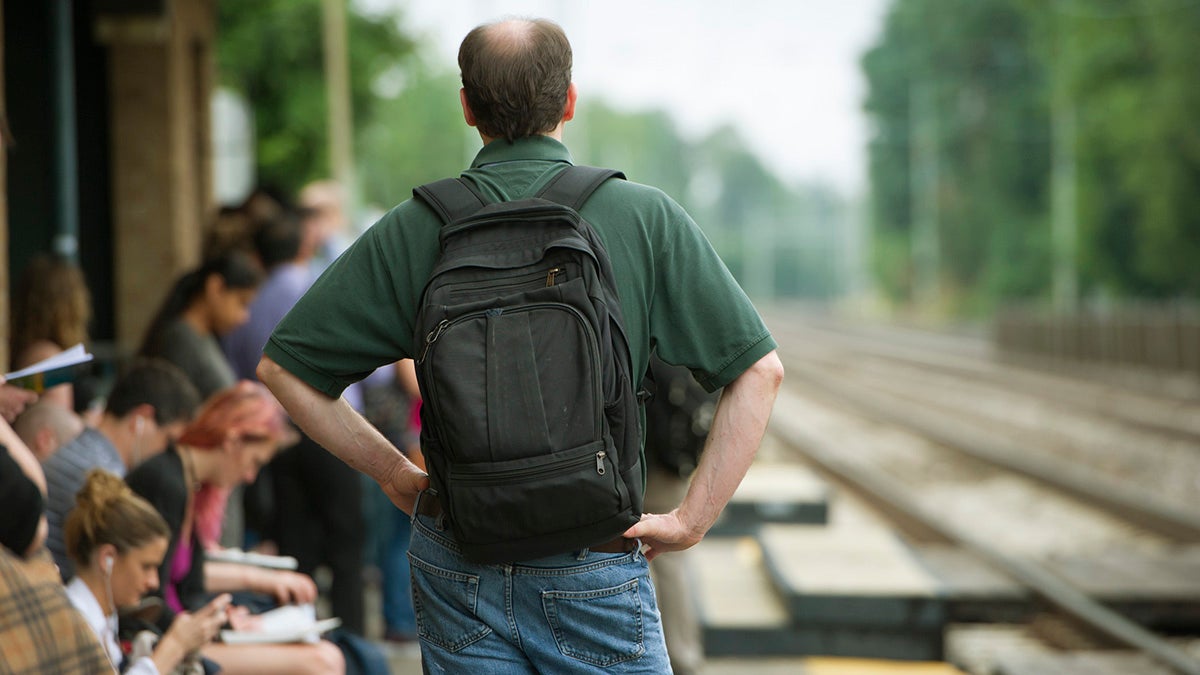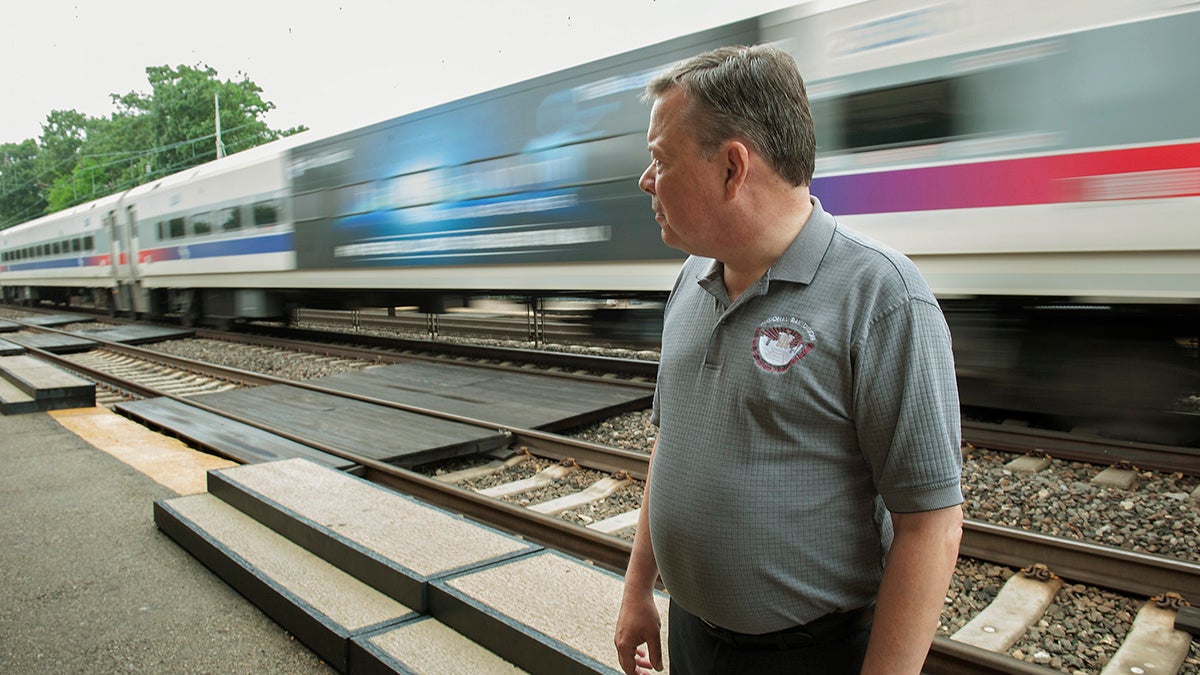SEPTA and Regional Rail commuters respond to reduced service, Hyundai Rotem silent on defect

Days after SEPTA pulled nearly every railroad car Hyundai Rotem built out of service, no one is picking up the phone at the company’s manufacturing facility in South Philadelphia.
Not for PlanPhilly and, it seems, not for SEPTA.
While SEPTA General Manager Jeff Knueppel said at a press conference Tuesday that Hyundai Rotem has been “supportive” and “cooperative”, senior SEPTA officials groused privately to PlanPhilly that they were having difficulties getting Hyundai Rotem representatives on the phone.
That’s a bad sign for SEPTA Regional Rail riders, many of whom were surprised to learn about SEPTA’s decision over the holiday weekend to remove nearly a third of its fleet from service after fatigue cracks were found Friday morning on parts that help prevent trains from tipping at curves. The railcars are still under warranty, meaning that Hyundai Rotem should cover the costs of fixing or replacing the equalizer bars, which inspections revealed cracks on 115 of the 120 Silverliner V cars built by the company under a $274-million contract. If communication lines aren’t flowing well between the company and SEPTA, it could delay repairs. The rough relationship also makes it more likely that this fiasco will ultimately end in litigation.
Knueppel said SEPTA engineers are still figuring out what caused these fatigue fractures. Previously, SEPTA said that the reduced Regional Rail service would at least through August, and perhaps into September and beyond. Knueppel said that he hopes to have an accurate estimate soon on how long it will take to repair or replace the defective equalizer bars.
Knueppel also said that SEPTA is looking to lease additional Regional Rail cars from peer transportation agencies. Knueppel said that deals could be signed as early as Wednesday with Amtrak, NJ Transit and the Maryland Transportation Authority to lease a few trains. Knueppel emphasized that those added trains would help a little, but wouldn’t come close to replacing the 115 cars now out of service.
SEPTA said that its other modes can handle more riders and have increased services on its Norristown High Speed Line, Broad Street Line, Market Frankford Line, and Trolley Routes 101 and 102. This morning, SEPTA estimated that its regional rail capacity was reduced by the equivalent of 13,000 seats, and that somewhere between 35,000 and 40,000 riders managed to squeeze on packed trains. Usually, Regional Rail handles 65,000 passengers, with most trains during rush hours at 90 percent of maximum capacity.
Despite the anticipated crush, riders this morning did not opt for some of the alternatives said SEPTA, including, surprisingly, the Norristown High Speed Line (NHSL), which covers many of the same areas as SEPTA’s Paoli and Norristown Regional Rail Lines. SEPTA officials said that, in particular, Regional Rail riders who usually board at stations located closer to or within the city should opt for alternatives.
To help, SEPTA has made arrangements for extra, free parking at some of its subway stations, including AT&T Station, Spring Garden Station, and the Frankford Transportation Center. NHSL riders who park at the Norristown Transportation Center can show their ticket to park at a reduced, $3 rate there. Most Regional Rail Stations have bus lines located nearby that can replace the train.
SEPTA officials said that the first discovered the crack late Thursday night on one particular car, and then quickly decided to inspect the rest of the fleet. When more cracks were discovered, SEPTA says they decided to pull the cars from service immediately. SEPTA announced the Silverliner V recall on Saturday morning.
Representatives of the Transport Workers Union Local 234, however, have challenged that account. TWU 234 treasurer Joe Coccio accused SEPTA of having known about the cracks in the Silverliner V equalizer bars for months now. According to Coccio, the trains are inspected every day, and these cracks would have been visible to the naked eye. “For them to even remotely want to believe that they just found out that 95 percent of the cars were cracked, and they inspect every car every day, that’s impossible,” said Coccio. Coccio contends that the weekend announcement and massive service shutdown were calculated to help SEPTA officials justify granting a large vehicle construction contract to a company other than Hyundai Rotem.
At today’s press conference, Knueppel denied that SEPTA officials knew about the cracks earlier, and said that safety concerns alone drove the decision. In a call with PlanPhilly, assistant general manager Ron Hopkins also refuted the TWU 234 account. While all cars in SEPTA’s fleet receive a daily visual inspection, the equalizer bar cracks could not have been seen during one of those, said Hopkins. Only a more detailed inspection where the cars are placed over pits could reveal the defect, said Hopkins, and that’s what happened Friday.
According to Hopkins, Federal Railroad Administration regulations require trains with cracked equalizer bars to be immediately put out of service.
Coccio’s union has been urging SEPTA to include a local-source preference in its bidding documents for bi-level Regional Rail cars. TWU 234 represents bus operators, bus mechanics, and workers at the Hyundai Rotem plant in South Philly. SEPTA has budgeted around $201 million for purchasing 45 new cars, which can hold more passengers than single level cars like the Silverliners. In addition to Hyundai Rotem, Montreal-based Bombardier and Chinese-owned CRRC USA Rail Corp. in Springfield, Ma. submitted bids to build the bi-level cars.
Despite supportive letters from City Council and Governor Tom Wolf, SEPTA refused to add a local-source procurement preference. According to Knueppel, Hyundai Rotem is the only train manufacturer located in Pennsylvania, so such a preference would effectively remove all other competitors for the bid. Besides potentially leading to more expensive bids, such a move could threaten SEPTA’s ability to receive federal funds for the vehicle construction, said Knueppel. SEPTA is still evaluating the bids, which were submitted in March, and declined to say whether this latest problem with the Silverliner Vs would adversely impact Hyundai Rotem’s chances at winning another contract.
SEPTA has had trouble with the Silverliner Vs ever since it gave Hyundai Rotem the contract in 2006. The trains arrived in 2013, three years late. Under the $274 million contract, Hyundai-Rotem was liable for $200 per day that each of the cars was delivered late. That resulted in around 65,000 late days totaling $13 million. That money was used to overhaul 33 regional rail push-pull cars at the South Philadelphia facility.
Transportation authorities in both Denver and Boston have also purchased vehicles assembled by Hyundai Rotem in Philadelphia. Like the Silverliner Vs in Philly, Boston’s trains arrived late and plagued with problems. Denver started receiving their trains in 2014, and there have been no major problems reported.
As of Tuesday evening, Hyundai Rotem has not responded to PlanPhilly’s multiple attempts to contact company representatives to discuss the defective railcars. In addition to leaving multiple voicemails, PlanPhilly tried emailing the company, but the message rebounded because the “recipient’s mailbox is full and can’t accept messages now.” PlanPhilly also tried contacting the company through social media and through its corporate parent, Hyundai Motor Group.
WHYY is your source for fact-based, in-depth journalism and information. As a nonprofit organization, we rely on financial support from readers like you. Please give today.





